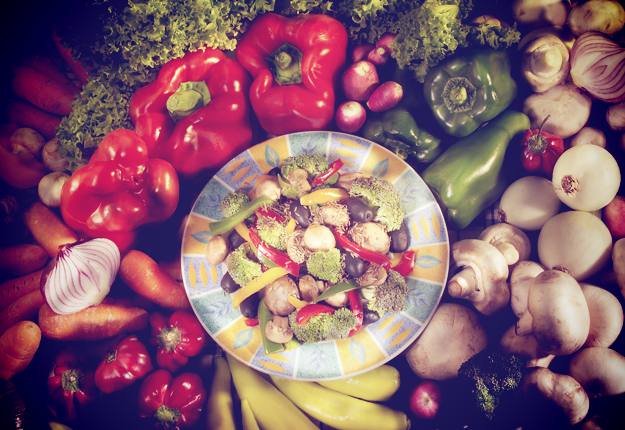Iron is essential to life. It’s involved in both the function and production of all cells in our body. Iron is vital for the production of DNA, which is basically the genetic ‘blue print’ on which all cells are formed and it supports energy production by transporting oxygen to the mitochondria, which is the ‘powerhouse’ of every cell where energy is made and where oxygen is needed to compete complete the energy production cycle.
Meat is a rich source of dietary iron and it’s commonly believed that because of this, meat eaters must get more iron from their diet than non meat eaters. Is that true? Or can you get enough iron from a vegetarian diet?
Vegetarian vs meat sources
There are 2 sources of dietary iron, haem iron and non-haem iron. Which basically means meat sources and non-meat sources (however meat does also provide some non haem iron as well). The difference in the two sources is that haem (meat based) sources are automatically absorbed regardless of how much our body needs, whereas non-haem sources and absorbed based on the body’s requirements.
Iron absorption and regulation
The more iron your body needs the more non-heam iron that will be absorbed. In times of increased need, such as pregnancy, our ability to absorb iron from non-haem sources further increases to help us reach healthy levels. Our body is an amazingly adaptive piece of machinery!
This adaptive mechanism also means that the body will absorb less non-haem iron when stores are high. This regulation is due to the fact that when it comes to iron more is not always better. Although iron is essential to life, you can have too much of a good thing! In fact excessive iron in the body can be harmful. Unlike other nutrients such as Vitamin C, the body has no means by which to actively excrete excess iron, therefore excess consumption can lead to build up which can cause free radical damage and is associated with heart disease, aging and other chronic diseases. Unless there is an underlying medical condition, increased dietary iron is unlikely to cause excessive iron build up, however this can easily occur when excessive supplemental iron is consumed. Therefore supplementation should only be consumed in times of increased need when dietary intake is inadequate.
In this respect, vegetarian sources are a healthier, gentler source of iron and, studies show that vegetarian diets provide no less iron than meat based diets. In actual fact Australian, studies show that those eating a vegetable based diet are no more likely to suffer anemia than meat eaters.[i]
Factors hindering iron absorption
However it’s important to be aware that phytates, found in the fibrous portion of plant foods can inhibit the absorption of iron. As plant based diets are naturally high in phytates, it’s good to ensure simultaneous consumption of nutrients including vitamin C to help improve absorption, for example a glass of orange juice with your spinach salad. To further improve iron uptake from for or supplemental sources it’s best to avoid simultaneous consumption of caffeine and calcium including calcium supplements, milk, coffee and tea.
Good vegetarian sources of iron
- Soy Beans
- Spinach
- Lentils
- Molasses
- Tofu
- Chickpeas
- Tempeh
- Lima beans
- Kidney beans
- Black beans
- Pinto beans
- Potato
- Prunes
- Quinoa
- Millet
- Bok choy
- Brocolli
- Silverbeet
- Brussel sprouts
- Apricots
- Raisins
- Tahini
- Peas
- Almonds
- Bulghur
- Sesame seeds
- Cashews Pumpkin seed
So if you are following a vegetarian diet, you can still achieve good healthy levels of iron by incorporating a variety of these iron rich foods into your diet and combining them with food high in vitamin C. In both vegetarians and meat eaters iron supplements can be beneficial during times of increased need but high dose supplementation should only be taken at the direction of your health care professional, when deficiency has been established
[i] Hunt, J.R Bioavailability of iron, zinc and other trace minerals from vegetarian diets. Am J Clin Nutr. 2003. 78:p633S-639S.




















9:00 pm
12:27 pm
1:24 pm
6:37 pm
10:25 am
12:05 pm
11:28 pm
10:55 pm
7:45 pm
4:58 pm
9:55 pm
7:44 am
12:34 pm
10:34 pm
9:52 am
6:27 pm
4:22 pm
10:45 pm
5:11 pm
6:51 pm
- 1
- 2
- …
- 11
- »
Post a commentTo post a review/comment please join us or login so we can allocate your points.